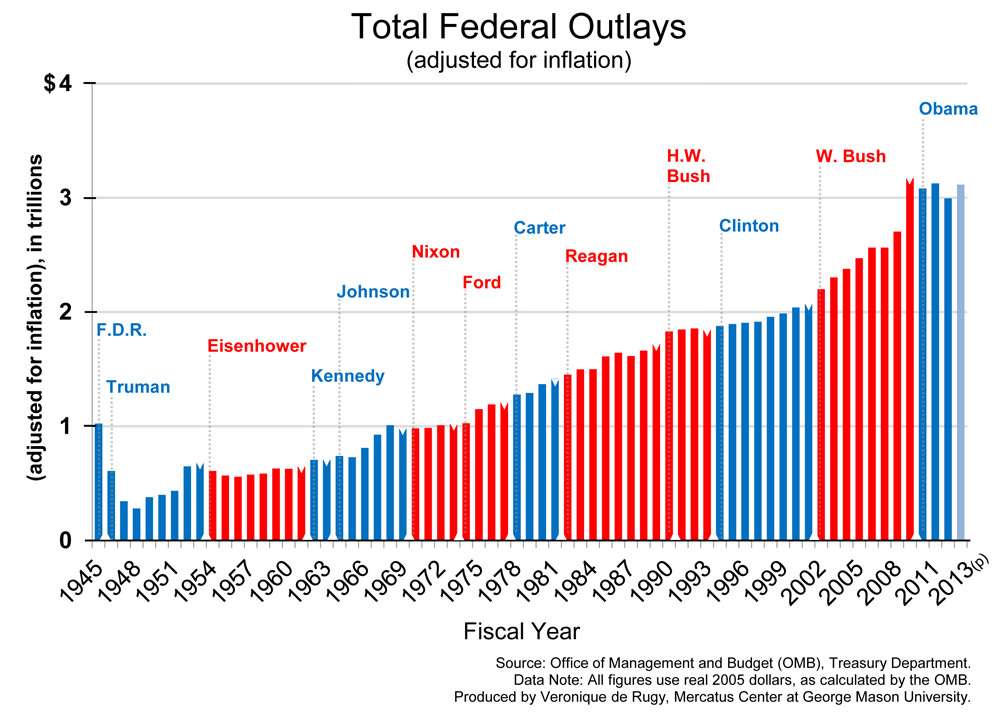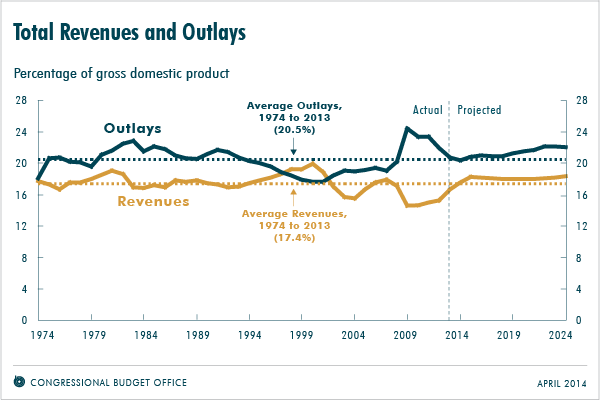Rand Paul Is Right: Carter Was Thriftier Than Reagan
The sooner the GOP groks this, the sooner they will support limited goverment.
Note: This story has been updated by the author at 12 noon ET.
Mother Jones does love found footage, doesn't it? The progressive mag's airing of Mitt Romney's "47 percent" comments at a fundraiser definitely hurt the former Massachusetts governor in his attempt to boot President Obama in 2012.
Now Mojo is back with the vid above, which the mag must hope will discombobulate Republicans and help put the brakes on a libertarian-leaning senator whose anti-war and anti-NSA stances draw long looks from disaffected liberals and lefties.
"Rand Paul: Jimmy Carter was better on the budget than Ronald Reagan" is how the vid begins. It shows the Kentucky senator in a variety of settings between 2007 and 2009 slagging St. Reagan as a spendthrift.
As Mediaite's Andrew Kirell points out, all of Paul's basic statements about spending under Reagan are absolutely true. The short version: Reagan spent like a drunken sailor and skipped out on the bill.
Here's a chart by Reason columnist and Mercatus Center economist Veronique de Rugy:

Paul is correct to say that Reagan was worse than Carter when it came to spending. As de Rugy does the math, Carter increased real spending 17 percent over the last budget of his predecessor, Gerald Ford. Over two terms, Reagan increased spending by 22 percent over Carter's final budget. On an annualized basis, then, Carter grew spending by 4.25 precent a year, while Reagan grew it by 2.75 percent. However, when expressed as a percentage of GDP, spending under Carter averaged 20.6 percent per year while Reagan averaged 21.6 percent. Spending typically really gears up in a second-term president's final years, so it's plausible to theorize that had Carter managed to stick around for eight years, he might have equaled or surpassed what the real-world Reagan managed. Note: The paragraph above has been edited to better reflect annual spending patterns.
When it comes to debt, there's no question that Reagan was worse. Over an eight-year reign, he tallied up $1.4 trillion in deficits, or an average of $177 billion per year. Carter—a famously cheapskate Southern Baptist—racked up just $253 billion over four years, for an average deficit of $63 billon per year. Tax revenue went up sharply under Reagan, for sure, but like a Hollywood big shot, he still managed to spend ever larger amounts, resulting in an average annual deficit of 4.1 percent of GDP. The Peanut Farmer From Plains? A relatively tiny 2.3 percent of GDP. (All this data if from the Congressional Budget Office.)
Far from being the budget hawk of lore, Dutch had no problem jacking overall spending through the roof, especially when it came to military spending. As Reagan's first budget director, David Stockman, told Reason in 2011:
reason: Reagan was famous for saying that government wasn't the solution to the problem; government was the problem. Why wasn't he more skeptical of Pentagon claims of what they needed and of where their financial estimates were coming from?
Stockman: That's one of the mysteries of the time, I guess, and it's one of the factors that led to the utter failure of spending control. He was utterly uninterested in any detail of the defense budget, of any of the claims for dollars made by the Pentagon. He gave them a blank check, without question, and that had a two-fold effect. One, it ballooned spending just as we were massively reducing the revenue. But second, it created an enormous political impasse. And that is, the spending increases were so huge in defense that it became almost impossible to get anybody to look at you with a straight face on Capitol Hill and say we're gonna go after the food stamp program or school lunches, when you're just showering tens of billions of dollars on ammunition accounts and spare parts replacements and a massive expansion of the Navy, which was totally uncalled for.
After trimming some programs early in his presidency, Reagan came around to pushing massive increases on just about everything, including education (a newly formed federal department he promised to kill upon taking office), Medicare (which he had denounced as "socialized medicine" in the early 1960s), and Social Security (before championing massive hikes in payroll taxes in his second term, he had once called for making Social Security voluntary).
In many ways, Reagan's late-life embrace of old-age entitlements may have been his worst spending legacy. Created to address very different times and a very different workforce, Social Security and Medicare were in dire straits by the 1980s and had Reagan tried, he might have been able to replace these fundamentally unsustainable and unfair transfer programs into more effective and lower-cost safety net programs. Instead he called saving Social Security and Medicare—a feat accomplished through massive increases in FICA rates—"the highest priority of my administration." By the end of his presidency, the combined employee-employer rate was 15 percent, up from 9.35 percent in 1981 (and more income was subjected to Social Security tax to boot).

As I argued the other day at The Daily Beast, Reagan is the "Godfather of Groupon Government," of huge and ongoing discounts to current taxpayers. Just as Groupon makes purchases more attractive by offering major price breaks, Groupon Goverment makes government goods and services more attractive by charging taxpayers much less than the retail price.
The Godfather of Groupon Government is none other than Ronald Reagan, who campaigned on killing whole cabinet departments and then presided over deficits that were so scandalously large that even Andy Warhol felt a need to comment on them. Starting in 1983, revenue increased every year under Reagan, but so did spending…leading to a tripling of the national debt on the Gipper's watch.
Between 1974 (when new budget rules and accounting systems were put in place) and 2013, the CBO reports that total federal revenues averaged 17.5 percent of GDP while outlays averaged 20.5 percent of GDP. Expressed in terms of dollars, the government only charged Americans 84 cents per dollar of spending. Over the course of Reagan's two terms, revenue only covered 82 cents, thus generously offering Americans an 18 percent discount.
Three or four years ago, I heard then-Gov. Mitch Daniels (R-Ind.) give a great talk to a group of conservatives. I can't reproduce the exact phrasing but the gist went something like this. Daniels talked about going to college in the late '60s and early 1970s. He talked about how there were always a bunch of lefties and progs around on campus, talking about FDR and the New Deal and how it hadn't gone far enough. Daniels said he'd tell those folks to get bent (again, the phrasing isn't exact), because the New Deal was like 30 years ago, man, and it doesn't have very much to do with today's America.
So far, so good. Conservative-libertarian audiences like peeing on campus radicals and FDR. Daniels pulled some applause and hoots. But then he went on to say something that was really fricking awesome. He pointed out that here "we"—Republicans, he meant, or maybe fiscal conservatives more broadly—were in the 2000s and all "we" could do was invoke St. Ronald Reagan like he was the second coming of Jesus H. Christ (again, not his phrasing). Daniels looked around the room and said, You know, we're further in time from Reagan than those half-baked New Dealers were when I was in college. We've got to get new ideas, new policies, and a new vision of government. Times have changed. America has changed. Budget realities have changed.
The room was silent. Even the crickets were sitting on their hands (or whatever crickets have). In the movie of my mind, I'd like to think that I started a slow clap that eventually caught on and Mitch Daniels was carried out jubilantly by the crowd, kind of like Debra Winger is by Richard Gere at the end of Officer & a Gentlemen.
But of course none of that happened. Around the same time Daniels had also famously called for cease fire in the culture wars and for Republicans to focus on spending issues (the governor didn't mince words about how awful his former boss, George W. Bush, had been). Conservatives jumped all over him like pit bulls on a steak. Because he has a mind and was a serious thinker about policy, Daniels once discussed the effects of a possible V.A.T. tax during a talk about the legacy of Herman Kahn and was pilloried for that.
He left the podium that night having pissed off the very people who needed to hear his message the most, passed on a presidential run, and is now the president of Purdue University. If there was ever a victim of epistemic closure on the right, it was Mitch Daniels.
The point is: Take on Reagan's legacy and you're playing with fire. Especially if you're right about Reagan's terrible record on spending, which Rand Paul absolutely is. I used to think that the GOP would never move forward until it fully acknowledged just how utterly awful George W. Bush's presidency really was. Across every possible dimension—with the possible exception of immigration reform, where Dubya essentially created the DREAM Act that fills Republcan lawmakers with nightmares about cantaloupe-calved illegals "hauling 75 pounds of marijuana aross the desert"—Bush was a big-government disaster. Despite stated interest in a top-to-bottom makeover, the GOP isn't really interested in changing all that much of its general platform or vibe. Until they are, they can kiss libertarians goodbye, along with other rising segments of America. The GOP's one big ace in the hole is that they run against Democrats. But even that wears off.
Rand Paul is interested in doing things differently (check out this Google News capture of recent articles about the guy). He's actually reaching out to minority voters by talking about school choice and how free markets will help alleviate poverty and lack of opportunity. He's proposed budgets that actually cut government spending. He's the loudest political voice for civil liberties in an age of ubiquitous government surveillance. He's pushing back against exaggerated fears of voter fraud and dumbed-down arguments about global warming. He's smart on military spending, which is to say he's against limitless defense spending and blunderous foreign policy.
He's not perfect from a libertarian angle—no politician is—but he is a damn serious threat to the Republican establishment. And to the Democratic status quo too. Which explains both why conservatives and establishment Republicans are going after him and lefty progs want to see him take a powder. And why his star is rising among the growing number of political independents who are sick of living in a fantasyland of the past and a thoroughly disappointing present. When the knives come out to cut him down to size—from the right and from the left—I hope he has the guts to stick to his libertarian guns.
Over the past dozen-plus years, we've seen what conventional Republicans and Democrats have to offer America, and it ain't pretty. Change is needed and it ain't going to be easy. But that just makes it more important to fight for.


Show Comments (251)